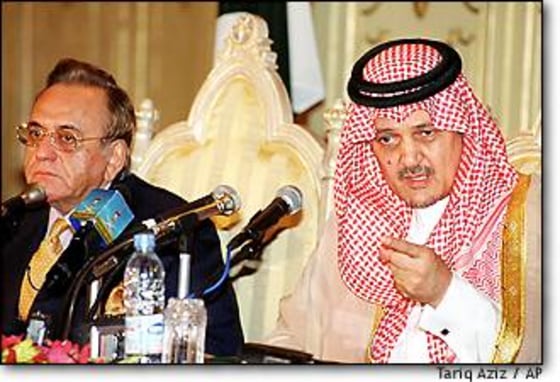Facing opposition from Muslim conservatives, Saudi Arabia and Pakistan said Sunday they would be reluctant to send troops to Iraq without a clear invitation from the Iraqi people. The United States wants to broaden the occupation forces in Iraq, especially with soldiers from Muslim nations. Washington has turned to Pakistan in particular with a request for at least 10,000 troops.
“If the people of Iraq ask for help, Pakistan as a brotherly country will do what it can. But we will wait for that to happen,” Pakistan’s foreign minister, Khursheed Kasuri, said at a news conference with his Saudi counterpart.
Saudi Foreign Minister Prince Saud al-Faisal said it was premature to talk about sending troops to Iraq until it is clear that Iraqis want them.
“The express opinion of the Iraqi people has not been shown to us, and until that time ... we will not send any troops,” al-Faisal said during a visit by the Saudi crown prince to Pakistan.
The comments came four days after the U.N. Security Council unanimously adopted a resolution urging all U.N. member states to contribute money and troops for Iraq’s reconstruction. Pakistan, a member of the 15-nation council, voted for the resolution.
Before ending his two-day visit, Crown Prince Abdullah denounced Islamic extremists and Osama bin Laden’s al-Qaida network, although he mentioned no names.
‘CRIMINAL TERRORISTS’
“A handful of criminal terrorists have destroyed our relations with other people,” said Abdullah, who is the de facto Saudi ruler in the absence of his ailing brother, King Fahd. “They have disfigured the picture of Islam and Muslims. We should fight this small group and prove their claims wrong.”
Both Pakistan and Saudi Arabia are allies in the U.S. campaign against terror, but there is opposition within both countries to the American-led war in Iraq and the occupation of a fellow Muslim nation.
Turkey is so far the only major Muslim nation that has offered to send troops to Iraq to aid with the reconstruction effort — an offer that has been rebuffed by members of the Iraqi Governing Council. Iraqis have opposed troops from any neighboring countries, fearing they would not be neutral.
Al-Faisal was not specific about what the Saudis would consider a legitimate request from “the people,” and whether acceptance by the Governing Council would be enough.
The Saudi government had viewed Saddam Hussein as a threat to its own security, but like most Arab regimes did not support a U.S. war to topple him.
RISKY FOR MUSHARRAF
InsertArt(2045534)While the Saudi rulers keep a tight lid on public dissent, demonstrations in Pakistan against the U.S. invasion of Iraq and the subsequent occupation have been frequent, and it would be politically risky for President Pervez Musharraf to send forces.
Kasuri said Pakistan’s armed forces have their hands full trying to seal the country’s border with Afghanistan, and also maintain a large presence on the frontier with rival India. But he said the country would consider a troop request from Iraq.
Islamic groups have warned Musharraf against sending troops to Iraq. In August, clerics said troops wouldn’t be eligible for martyrdom, and wouldn’t even deserve an Islamic funeral, if they die helping the U.S. coalition.
